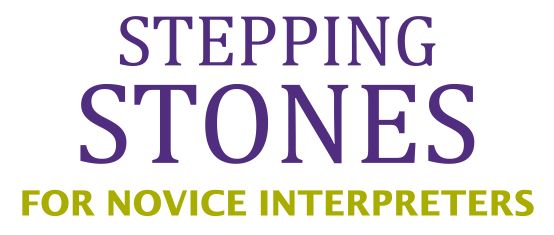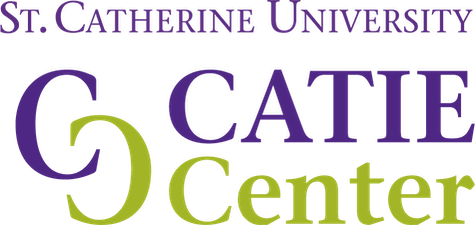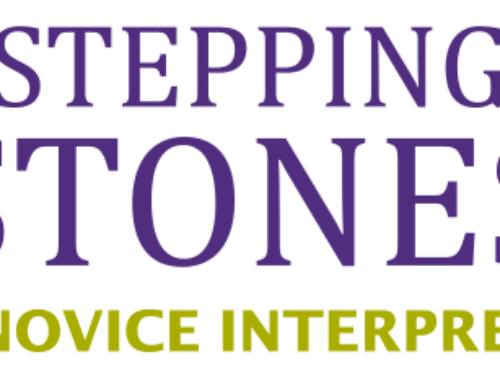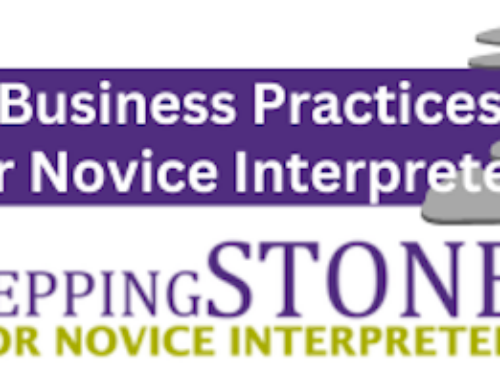
- Are you looking to elevate the level of your interpreting skills?
- Are you interested in being ready to interpret in a variety of work settings?
- Are you looking for no-cost high quality options?
Check out this free online course on building capacity for interpreting in work settings. It is an offering in Stepping Stones for Novice Interpreters, a self-directed track from the CATIE Center’s Dive In project.

Description
Build your ASL and interpreting knowledge and skills for a variety of work settings!
Interpreters work in a variety of employment settings and how language is used will vary depending on the setting as well as the people involved.
This online course is designed to give novice interpreters opportunities to review possible frameworks for approaching interpreting, with practical applications to work settings.
- Engage in deliberate practice to build your interpreting capacity.
- Learn from and practice interpreting for Deaf people talking about their work in a series of videos created by the National Association of the Deaf .
- Increase your competency in a variety of work settings that include a Deaf person being interviewed in ASL about their work, a hearing person in a similar position being interviewed in English about their work, and then those two people having a conversation about their work. You can practice interpreting the interaction and then see a sample interpretation with a reflection by the interpreter who was there for the original conversation.
- Learn about interpreting for vocational rehabilitation, including perspectives from two VR counselors.
Over ten work settings are presented including marriage and family therapy; library and information science, and architecture.
Learning Objectives
Participants completing this course will:
- List characteristics of effective interpreters in vocational rehabilitation settings
- Identify interpreting strategies for at least 4 work settings
- Assess their own interpreting work
- Compare and contrast their interpreting work and samples from other interpreters
- Reflect on their own work using the sample interpreter reflections as a model
The course is designed to be completed at your own pace. Each module have a specific focus and include opportunities for application and reflection.
A Note on CEUs
Because our grant is focused on novice interpreters working toward certification, CEUs are not offered by the CATIE Center. The CATIE Center has an agreement with the Minnesota Registry of Interpreters for the Deaf.
For $40 (a cost set by MRID), you can receive ACET or CMP CEUs for this course. At the end of the course, you will have access to a form to apply for CEUs and receive a link for making the payment. So, you don’t have to commit to making a payment until you know that you will be able to complete the requirements. (MRID members receive a free processing of a Stepping Stones workshop, a PINRA, or an Independent Study each year – so if you are an MRID member, you can get this cost waived.) For more information on the CEU process, contact pdc@mrid.org.
Minnesota Registry of Interpreters for the Deaf is an approved RID Certification Maintenance Program (CMP) sponsor for continuing education activities. This professional studies program is offered for up to 2.4 CEUs at the little/none content knowledge level.
The CATIE Center promotes a mutually respectful learning environment free of bias. See St. Catherine University’s non-discrimination policy for more details.
Registration is still open for this course, but no facilitation is offered.
Learn about ongoing access to Stepping Stones courses

The registration form will provide you a link to enroll in a free Canvas course. It will also ask for optional demographic information which will be helpful for the CATIE Center in evaluating the effectiveness of these resources for supporting the diversity of novice interpreters who are entering the interpreting field.
About Stepping Stones for Novice Interpreters
This course is part of a series developed by the Dive In project of the CATIE Center at St. Catherine University. Each module will have a facilitator from the CATIE Center who monitors a Support Forum. The activities are designed so that you can do them asynchronously. Though possible to do independently, we encourage you to either join as a group and work through the material together – or use the introduction forum to seek out others in the course who might work with you in the discussions. Collaborative learning can be a really important tool in professional development.


